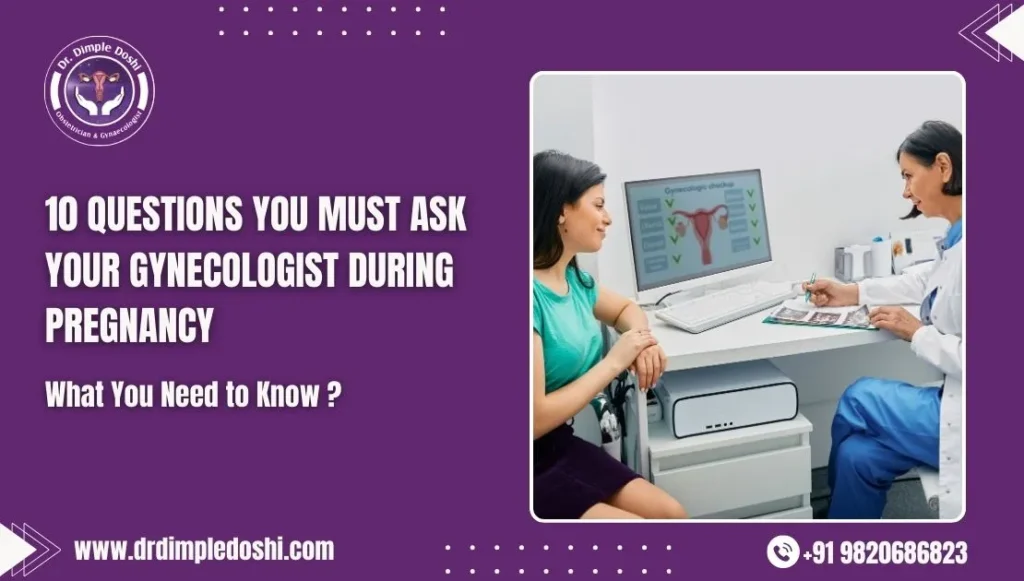10 Questions You Must Ask Your Gynecologist During Pregnancy

Introduction
Pregnancy is a beautiful yet overwhelming journey. From the moment you see those two lines, your mind fills with questions—Am I doing everything right? Is my baby growing well? Across the three trimesters, your body and baby change rapidly, and asking the right questions at the right time helps you stay confident, safe, and well-prepared. Here are the 10 most important questions every pregnant woman should ask her gynecologist.
How much weight should I gain during pregnancy?
Healthy pregnancy weight gain depends on your pre-pregnancy BMI and usually ranges from 7–15 kg overall.
Weight gain depends on pre-pregnancy BMI
Excess weight increases risk of:
Miscarriage
High blood pressure
Gestational diabetes
Preterm birth
Average weight gain pattern:
1st trimester: ~1 kg
2nd trimester: 3–5 kg
3rd trimester: 3–5 kg
Dr. Dimple Doshi’s Tip:
Weight gain should be gradual and monitored—crash dieting or overeating both harm pregnancy.
How much exercise is safe during pregnancy?
About 30 minutes of moderate exercise daily is safe in most pregnancies, with your gynecologist’s approval.
Exercise helps:
- Reduce back pain
- Control weight gain
- Lower risk of diabetes and BP
Recommended:
- Walking
- Prenatal yoga
- Light stretching
If previously sedentary:
- Start with 10 minutes
- Gradually increase to 30 minutes
Always consult before starting any new routine
Which medicines are safe and which should I avoid in pregnancy?
Many common medicines are unsafe in pregnancy—always consult your gynecologist before taking any drug.
Inform your doctor about:
- Prescription medicines
- Over-the-counter drugs
- Herbal or home remedies
Some medicines can cause:
- Miscarriage
- Birth defects
Never self-medicate during pregnancy
Dr. Dimple Doshi’s Tip:
If a medicine is not prescribed by your gynecologist, assume it is not safe until confirmed.
What kind of diet should I follow during pregnancy?
A balanced, home-cooked, hygienic diet is essential to nourish both mother and baby during pregnancy.
Eat:
- Fresh fruits and vegetables (washed well)
- Well-cooked food
- Protein-rich meals
Avoid:
- Junk and oily foods
- Raw or undercooked foods
- Refrigerated or stale food
Use only pasteurized dairy products
Do I need to modify my work schedule during pregnancy?
Most women can work normally, but heavy physical strain and prolonged standing should be avoided.
Usually safe to continue working
Avoid:
Heavy lifting
Pushing or pulling loads
Excessive fatigue
Discuss job nature with your gynecologist for personalized advice
Which vitamins and supplements are necessary during pregnancy?
Key supplements in pregnancy include folic acid, iron, calcium, vitamin D, and others as advised.
Folic acid: ~400 mcg daily to prevent spinal defects
Iron: Prevents anemia and fatigue
Calcium: Builds baby’s bones and teeth
Vitamin D: Helps calcium absorption (do not exceed prescribed dose)
Vitamin C: Improves immunity and gum health
Dr. Dimple Doshi’s Tip:
Supplements should be taken exactly as prescribed—more is not better in pregnancy.
Is travelling safe during pregnancy?
Travel is generally safe during pregnancy with precautions, especially before late third trimester.
Flight travel:
Usually safe till 36 weeks
Train travel:
Allowed till 37 weeks
Car travel:
Avoid long journeys
Take breaks to stretch and walk
Always wear seatbelts properly
What can I do to increase my chances of normal delivery?
Healthy lifestyle, stress control, regular activity, and good antenatal care improve chances of normal delivery.
- Reduce stress
- Sleep well
- Drink enough water
- Eat nutritious food
- Stay physically active
- Have emotional and family support
What is the best sleeping position during pregnancy?
Sleeping on the left side is best during pregnancy as it improves blood flow to the baby.
Left-side sleeping:
Improves placental blood flow
Enhances nutrient supply to baby
Reduces pressure on liver
Use pillows for comfort and support
What are the signs of labor or delivery?
Labor signs include regular contractions, pain, bleeding, water breaking, and pressure sensation.
Common signs:
- Regular painful contractions
- Vaginal bleeding
- Water breaking
- Backache
- Pelvic or bowel pressure
Contact your gynecologist immediately if these occur
Dr. Dimple Doshi’s Tip:
Never ignore early labor signs—timely hospital arrival ensures safer delivery.
FAQs – What Pregnant Women Often Ask
Q1. Is every pregnancy different?
Ans. Yes, every woman and every pregnancy is unique.
Q2. Should I ask questions even if I feel normal?
Ans. Absolutely—preventive guidance is as important as treatment.
Q3. Can stress harm my baby?
Ans. Chronic stress can affect pregnancy—mental well-being matters.
Q4. How often should I see my gynecologist?
Ans. As per your antenatal schedule, or sooner if symptoms arise.
Conclusion
Pregnancy is a journey best navigated with clear communication and trust between you and your gynecologist. Asking these 10 essential questions helps you make informed decisions, reduces anxiety, and ensures the best possible care for you and your baby.
At Vardaan Hospital, Goregaon West, Mumbai, I encourage every expectant mother to speak freely, ask doubts without hesitation, and take charge of her pregnancy with confidence and knowledge.
